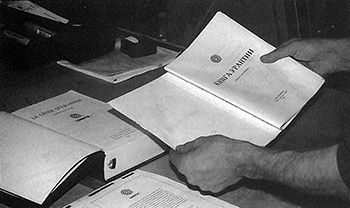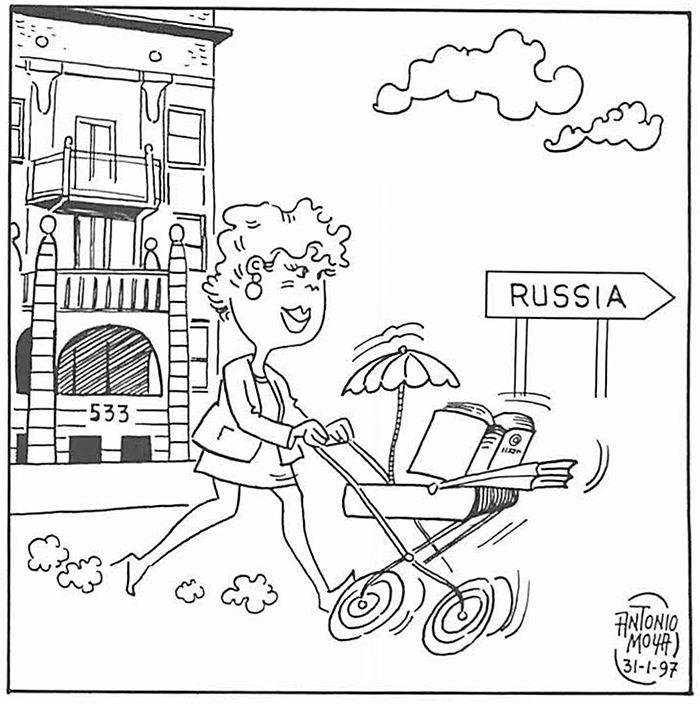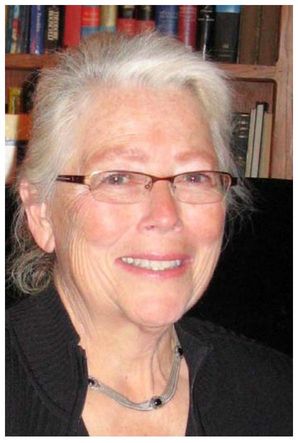© 1997 Michael Hanian
© 1997 Urantia Foundation
¶ Russian Translation Arrives
By Michael Hanian

In 1990, apparently by pure chance, I discovered The URANTIA Book and started working on the first draft. At that time I didn’t think of the consequences of such an undertaking, nor about the magnitude of effort it would involve; I did it for my own purpose, which was to facilitate the reading of a very unconventional text.
In about a year my brother, Andrei Reznikov-motivated by acute concern about my mental health-offered his help as copy-editor. As time went by, Andrei’s initial motivation gave way to genuine enthusiasm, and his participation proved to be of utmost importance for the whole project.
In three more years Vadim Knorre, Professor of physics and a poet, was invited to join the team as final copy-editor.
Since translator and copy-editors live on different sides of the Russian border, we had to work separately most of the time. Of course, we had such convenient tools as e-mail and telecopiers, but each “live” session has been a rare and precious occasion, a chance to solve a number of things in a Sturm-und-Drung manner.
Quite naturally, we faced a lot of text-related difficulties, which can be classified as conceptual, structural, and methodological.
Consider the difficulties in the conceptual group, of conveying what an agondonter is-by comparison, reality-ize was easy.
Within the structural group I would single out problems of an intra- and interlinguistical character, the former originated by the complexities of the original and the latter by the essential differences between the English and Russian languages.
Due to the advantages of an analytical language, English allows such luxury as chained adjectives (mind-spirit personality) and invariants (one and the same form performing different functions). In English almost any noun can become a verb or an adjective without any change in the word itself; so it is possible to have a table, or to table a proposal, or to have table salt on that very table. In Russian, nouns, verbs, and adjectives must be invested with an appropriate form; so where English doesn’t care if there is an adjectival or a verbal shape, Russian has to know this for sure. And when there is simply no, say adjectival form, we are in trouble-like in the case of “Deity relations” (646), which has to be translated as “pertaining to Deity.”
In the methodological group there are problems of finding appropriate methods for translating The URANTIA Book. Is the fact of dealing with a revelation relevant for translators? If yes, should this be reflected on the fluency vs. exactness of scale? What is the referential authority in the situation where there is no human author? Some of these questions are more of an academic nature, but all of them presupposed tough choices and hard decisions.
Anyway, now it’s in the past, and we all await, with mixed feelings, for the readers’ feedback which will help us refine the Russian translation for the second printing.

¶ Translations

By Patricia Mundelius
One of the most memorable meetings I ever attended was the Translators’ Conference in Paris last year. Twenty-five masters of language generously shared their experiences-the challenges, difficulties, and triumphs-with translating The URANTIA Book into their respective native languages. It was fascinating to hear about their solutions to different problems-problems of syntax as well as meaning. How does one pour the liquid of language from the bottle labeled “English” into a French carafe or a German stein while keeping the contents as crystal clear as “the original” English translation, given to Urantia?
There were obvious linguistic kindred spirits at the conference: The Italians, French and Spanish seemed to be drawn to one another. The Dutch, Germans and Swedes exhibited a special bond, as did the Finns and Estonians. The Russians and Koreans, however, were the sole representatives from their linguistic families, and they had unique translation problems not shared by the other translators.
Before I arrived at the conference, I anticipated that I’d be in the presence of men and women who were gifted linguists. However, I was not prepared to meet women and men so driven by their love of The URANTIA Book and so motivated to share its supernal teachings with their kinfolk. Their superior language skills paled in comparison to their incredible gifts of love and service to their fellows. One of the translators recently said to me that “a translation is a labor of love made visible.”
Another observation I would like to share with you is this: Not only are outstanding translations being made, but superior and unique teachers-the translators-are being trained. I was stunned with the realization that the translation process was an invaluable end in and of itself, in addition to the translations being created! The experience of translating The URANTIA Book creates a new breed of URANTIA Book teacher-student.
The interaction among these men and women translators was something to behold. I won’t forget that weekend ever. The Trustees are already making plans for another conference later this year or early next year.
We are on the brink of a translation explosion. The first translations came slowly and one at a time-the French, the Finnish, and the Spanish. But times are changing. Already in 1997, the Russian translation is available and later this year the Dutch will also be published. Next year the Korean and Swedish translations will go to press. Work is in progress on the German, Estonian, Italian, and Arabic translations with Chinese, Portuguese, and Hindi in the wings. The cross-fertilization of ideas and experience at the next Translators’ Conference should be spectacular.
The job is not over once a translation is completed. According to the Declaration of Trust Creating URANTIA Foundation, these teachings must be disseminated-worldwide. The next challenge we face is distribution. Problems and solutions vary from country to country. The Foundation recognizes that the best approach is one of decentralization. Offices are therefore being established where there is a need. At this time, there are URANTIA Foundation offices in Australia, England, Finland, France, and Spain. We are in the process of setting up offices in Russia and México. Our offices deal not only with book distribution but also with reader services.
The 21st Century brings the challenge of growth. The Foundation is laying the groundwork to meet this growth explosion. These are exciting times for all of us. This is surely the “time of translation” and the beginning of the worldwide spread of these beloved teachings. Come join us and share the joy of this service.
“It is this ability to communicate and share meanings that constitutes human culture and enables man, through social associations, to build civilizations. Knowledge and wisdom become cumulative because of man’s ability to communicate these possessions to succeeding generations.” (The URANTIA Book, UB 160:2.3)
¶ Translations and Competition
Two Trustees of URANTIA Foundation, Tom Burns and Georges Michelson-Dupont, went to Moscow and St. Petersburg in late February. The purpose of their trip was to personally deliver the newly printed Russian translation to readers who had been patiently awaiting its arrival.
What a thrill it was for the two Trustees to meet with their newly discovered sisters and brothers and to present them with copies of the Russian translation of The URANTIA Book! It is so true that “‘in the experience of finding the Father in heaven you discover that all men are your brothers, and does it seem strange that one should enjoy the exhilaration of meeting a newly discovered brother? To become acquainted with one’s brothers and sisters, to know their problems and to learn to love them, is the supreme experience of living.’” (UB 130:2.6)
The Russian readers had heard that a second translation might be published by a publisher unaffiliated with URANTIA Foundation. They were disturbed by this news and felt that more than one translation would cause confusion and division, and would also be a waste of precious resources.
The Trustees met recently with five members of the Fellowship’s executive committee. It was agreed that the Fellowship and the Foundation would strive to be cooperative instead of competitive-with emphasis on co-operative efforts on translations. Unfortunately, since that meeting, the Fellowship’s General Counsel passed a resolution “to establish translations of The URANTIA Book into many languages as a priority effort.”
Almost everyone agrees that translating The URANTIA Book into many languages is of paramount importance, and that it is an enormous task-one which requires all available goodwill. Therefore, the Trustees of URANTIA Foundation-whose mission it is to protect, translate, and disseminate the Book-offer their hand, in the spirit of peace, brotherhood, and cooperation, to the Fellowship, and any other group or individual who wants to serve this Revelation. We ask you to join the URANTIA Foundation in its efforts to bring the teachings of The URANTIA Book to the peoples of Urantia by way of translating the Book into the many and diverse tongues of our planet.
“The workers in vineyards [of the fifth epochal revelation] are few.” Why then waste valuable time, money, and energy in competing when we could be cooperating for the welfare of the Revelation? Are we the living branches which bear the fruits of the spirit? Are we living in such a way that others recognize us as disciples of Jesus and citizens of the kingdom of love, mercy, and service?
Conclusions. As dedicated readers of The URANTIA Book and members of the universal family of God, it is our privilege to behave in a way which advances the teachings of the Book and promotes unity among readers. “A house divided against itself cannot stand.” We suggest to everyone, and to all organizations involved in any way with The URANTIA Book, that they ask themselves the following question before they make any decision that will impact the Revelation: Will making this decision promote spiritual unity and serve the Revelation?
“In civilization much, very much, depends on an enthusiastic and effective load-pulling spirit. Ten men are of little more value than one in lifting a great load unless they lift together-all at the same moment. And such teamwork-social co-operation-is dependent on leadership.” (UB 81:6.37)
¶ A Translating Experience
by the Korean Translator
In the fall of 1976, I discovered The URANTIA Book in a bookstore in Pittsburgh, and immediately became an avid reader. After about ten readings, I desired to share it with the people of my native land. I wrote the URANTIA Foundation and told them I wanted to translate The URANTIA Book into Korean. In June of 1993, I received approval to do so, and my wife and I started translating immediately.
We did the translation in three stages. In the first stage, we translated The URANTIA Book, which took three years. In the second stage, we checked the translation to make sure it was “true to the original text.” (It is surprising how often we neglected to translate a word or even a sentence.) And finally, in the third stage (we’re in the third stage now), we are editing and polishing the verified text. My wife serves as my sounding board; she checks rough spots, and she is of tremendous help, especially when we debate the relative merits of alternative translations of a given text.
South Korea has a population of forty-two million. Fifteen million are Christians. North Korea has a population of twenty million, but very few Christians have survived.
South Korea sends more Christian missionaries to other parts of the world than any other country. Koreans are a fervent people. I believe that they are hungry for spiritual truth, and that they will readily accept The URANTIA Book and its teachings. Once completed, a Korean version of The URANTIA Book would sweep the entire Korean peninsula, and someday Korea might even serve as the new Salem in Asia.
Early Christians made many compromises to render the gospel more palatable to the peoples of the Mediterranean world. It took about nineteen centuries for the gospel to penetrate the Asian continent, and the distorted and diluted truth became less palatable to the Asian nations. It was not well-received. Except in Korea, the gospel of Jesus has had little impact on Asia. Three and a half billion Asians are sitting in theological darkness, persisting in ancestral worship. Asia is the last spiritual frontier on Urantia! We need to provide Asians with badly needed spiritual nutrients. The teachings of The URANTIA Book may be just the spiritual fertilizer that the religious soil of Asia needs.
The table to the right shows the twelve principal languages of the world . I have no doubt that in the age of light and life, English will be adopted as the universal language. During the transition period, however, The URANTIA Book needs to be translated into a dozen or more major languages so that the new revelation will reach all human races.
TABLE 1. THE PRINCIPAL LANGUAGES OF THE WORLD
| LANGUAGES | NATIVE SPEAKERS (MILLIONS) | TOTAL SPEAKERS (MILLIONS) |
|---|---|---|
| Mandarin | 644 | 975 |
| Hindi | 340 | 437 |
| Spanish | 339 | 392 |
| English | 326 | 476 |
| Bengali | 193 | 200 |
| Arabic | 190 | 225 |
| Portuguese | 172 | 164 |
| Russian | 169 | 284 |
| Japanese | 125 | 126 |
| German | 98 | 123 |
| French | 73 | 125 |
| Malay-Indonesian | 52 | 159 |
Source: The World Almanac and the Book of Facts 1996. Original
Source: S. Culbert, NI-25, University of Washington, Seattle, WA 98195. Data as of mid-1995.
¶ Reader Comments About The Urantia Book
“It [The URANTIA Book] has, with its revelations, not only captivated me, but changed my outlook and gave me after a lifelong search the conviction of having, at last, found the Truth.” ~ Goslar, GERMANY
“I’m still drawn to the pages with wonder, 20 years later, almost as if reading anew.” ~ Portland, Oregon, U.S.A.
“I haven’t been able to read the entire book yet, but even after reading a few parts a lot of things became clear to me.” ~ Den Hague, NETHERLANDS
“For over 25 years I have been a reader of The URANTIA Book. One of my delights has been to correlate this wondrous volume with real life experiences in order to continue to validate the book’s greater substance.” ~ Elko, Nevada, U.S.A.
“The URANTIA Book has been part of my life for a good 20 years. The URANTIA Book is not a Holy Book but its teachings given, little by little, in wisdom will draw us closer to each other.” ~ San Diego, California, U.S.A.